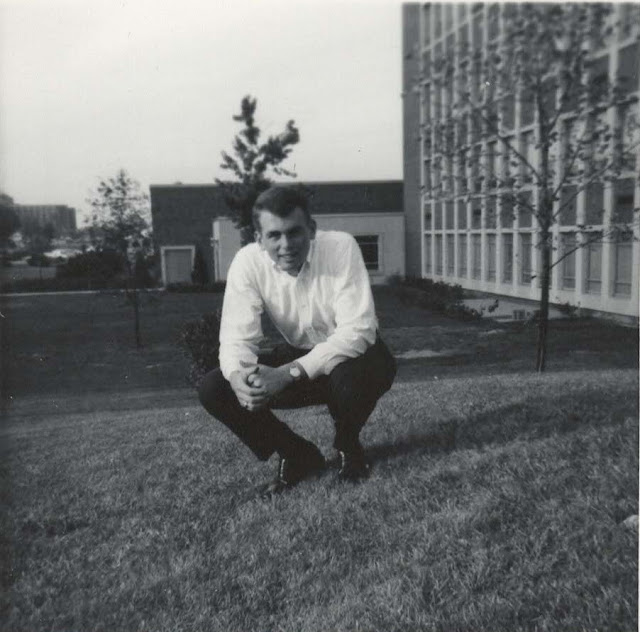 |
| Greg at Purdue University |
Greg’s best years were spent as an executive in manufacturing. He had a bachelor’s degree from the Krannert School of Management in Industrial Management. It was his father’s idea. Greg wanted to go to law school, which he did eventually although his demanding job prevented him from graduating.
Greg would have excelled at anything he did. In fact, he did excel at everything he did. He did not resent his father for forcing him into a particular field of study. He felt he had a good career, one he enjoyed and grew in. However, it is a shame he never really got to pursue what he wanted.
Developing People Skills
One of the more defining experiences he had in his life was at Delco Remy while still in college, I think. I believe it was a summer internship. What made it a defining moment was the advice he got from a man who was his boss and at one time, and his future father-in-law.
Greg had spent much of his time working to solve a particular problem. When he presented the solution to his boss/future father-in-law he received the best advice of his career. Greg was told he had worked out the perfect engineered solution, but it would never work. Stunned, Greg asked why. He was told that he had ticked everybody off and that there was no way anyone would implement his solution.
His boss referred him to another guy whose solution was substantially less than perfect but whose people skills endeared him to the workers. His boss told him that this guy’s solution would work, after a sort, and would be implemented by the workers.
This lesson was not lost on Greg. From that time forth he worked to develop his people skills, and he never stopped.
[Note: He did not ultimately marry the girl in question so this the man did NOT become his father-in-law.]
Subtle and Unobtrusively Effective
However, it was almost impossible for others to recognize these skills. The reason is simple, it would have reduced his effectiveness if people knew what he was doing. I was under orders not to tell people. I can tell people now …
I recognized all of this soon after we got married. I remember watching him and listening to him and thinking, “He’s doing something … I know he’s doing something … What is he doing?!”
After all of these incidents, I would debrief him, “Why did you say this? Why didn’t you say this?” He always gave me a logical and reasonable answer except when he didn’t.
Sometimes his answer was “instinct.” That was his most irritating answer because then I had to figure it out for myself. He’d been using some of these skills for so long, they had become instinct.
After all of these incidents, I would debrief him, “Why did you say this? Why didn’t you say this?” He always gave me a logical and reasonable answer except when he didn’t.
Sometimes his answer was “instinct.” That was his most irritating answer because then I had to figure it out for myself. He’d been using some of these skills for so long, they had become instinct.
I have tried in vain to explain this all to myself or others. The negative term for what he was able to do is “manipulation.” There isn’t a positive term for it. The best term I’ve come up with is “maneuvering” but that isn’t entirely positive. How do I explain how he was able to get people to fall all over themselves to do exactly what he wanted them to do? I watched it time and time again.
However, he never used these skills unrighteously, so he didn’t always succeed.
People with these skills are generally ruthless and aggressive as well as wildly rich and successful. He could have been too if he had exercised them with no moral restraint. I’m so glad he didn’t. I wouldn’t have respected him as much as I did … do. I couldn’t have loved him as I did … do.
The Blue-Collar World
It was also around this time that Greg decided he didn’t really like management or management types and preferred the blue-collar workers he managed. The reason was simple enough. Management types could not be trusted and were often despicable people.
Greg discovered that the information and skills he needed to be a good manager resided in his workers, people often rough around the edges but with better hearts and kinder natures than the management types and management wannabees he was forced to interact with.
He learned from his workers and in turn, they respected him. He could perform any job in any of his factories and the workers knew it.
Once, some workers and their union representative argued that what he was requiring them to do was impossible. He promptly demonstrated it wasn’t by working the equipment himself and making certain the doubters were checking his quality and timing him. In the end, they couldn’t argue. He had proved his point.
Once, some workers and their union representative argued that what he was requiring them to do was impossible. He promptly demonstrated it wasn’t by working the equipment himself and making certain the doubters were checking his quality and timing him. In the end, they couldn’t argue. He had proved his point.
Temper and Temperament
He once told me that I probably wouldn’t have liked him when he was younger because he had a strong temper. He mastered it while young. He was able to completely master it as well as his other emotions. I didn’t think anyone would be able to master their temper in this life. I thought that would only be possible in the next life. With living proof before me, obviously, I had to master mine.
I told him I was grateful I got the broken-in version of him. He countered it by claiming he was actually the broken-down version …
He developed the remarkable ability to remain cool and manage his emotions. Law enforcement and medical situations demonstrate this well.
He had to get physicals in order to be hired for law enforcement positions. His resting heart rate was always good. However, it also had to be measured under stress where it … (wait for it) … got better. One medical professional measured his resting heart rate and his rate under stress many times because she couldn’t believe the results. She declared, “This is really weird!”
Greg was always a good shot. While at the police academy, his shooting got better. Cops seldom have to shoot under ideal conditions. When they were forced to shoot under stress, not surprisingly, Greg’s shooting was better than it was under basic target shooting.
Innovative Solution to a Difficult Problem
In one of his first jobs, he discovered a more experienced employee was stealing his ideas. He discovered this when he took ideas to his boss who declared he’d already heard them and that they were not original. He informed his boss of this intellectual theft. His boss didn’t believe him because he was the newer hire.
So, he conscripted two colleagues into his plan. He set up an elaborate hoax designed to convince the thief that he was working on something really secret and really special. Sure enough, the thief stole his ideas. However, when he took them to the boss, the boss laughed him out of the office exposing them as pure nonsense.
When Greg and his two conspirators then went to the boss and informed him what they did, Greg was believed this time. He used this sort of tactic in subsequent situations.
He never handed anybody the rope to hang themselves, but he allowed them to takethe rope to hang themselves. Then, he distanced himself sufficiently so that he wouldn’t go down in flames with them. But, he never enjoyed it when people destroyed themselves. He always saw it as a purposeless waste.
Bendix Corporate Offices and Beyond
At age 23 he found himself in a job that was ending. He had one last project to finish and one final presentation to make. From there, he had an interview to go to for a new job. Unbeknownst to him, Eldred Evans, who I believe was the corporate Vice-President of Manufacturing at Bendix at that time, was present.
As Greg was leaving for his interview, his boss snagged him to return. Greg was incredulous. His boss knew and had agreed to let him leave after his presentation for his interview. Eldred Evans wanted him for corporate management to work under him. So, at age 23, Greg was catapulted into top-level management working closely with Evans who became his mentor.
Evans was a highly competent executive. What’s more, he was an honorable and good man. Greg was able to really blossom under his mentorship and he always remembered him with fondness and respect.
While at Bendix under these conditions, Greg got nicknamed, “The Kid.”
Greg’s top-level management career really took off and continued for some time. It is very difficult to fully comprehend the magnitude of his accomplishments. He accomplished so much, while still young. He built his first factory at age 27.
He did greenfield startups, turnarounds, and expansions. Most people don’t even know what “greenfield” even means. Nor did I. I had to look it up. I believe the top number of people he managed was 500.
What always astonished me was how he was able to accomplish the turnarounds with existing employees. He wasn’t a hatchet-man who fired everybody and brought in his own people. He turned companies around with the same people who had almost taken the companies under. This is almost unprecedented. The conventional wisdom says this isn’t possible. I know it is because Greg did it.
This did not happen when we managed a mobile home community together. When employees are engaged in outright sabotage, you have to let them go. You have no choice. We had to fire several people there.
 |
| Greg posing with Indiana's Governor Orr. This was taken at one of the factories Greg built. |
Employment, Unemployment, and Upheaval
Greg did experience a lot of job upheaval. At the level he functioned at, terminations were power plays and turf battles, not competence. Through his skills, he was able to hang on longer than he otherwise would have been able to.
Many of his lost jobs were due to the dishonorable actions of owners or co-workers. Greg wouldn’t do anything unethical or illegal and believe me, he was pressured to numerous times. He held out and it cost him.
His last executive-level corporate job was the one he held when I married him. I cannot discuss the details of his separation from that company because I am covered by legally binding confidentiality agreements. But Greg did nothing wrong. He did so much to be admired, and I admire him for it.
At a strategic point in his career, he resolved to stop climbing the corporate ladder and he did. It was a result of him joining The Church of Jesus Christ of Latter-day Saints. I’ll let him say it. This is a passage from his journal:
When Greg's last corporate job ended, he took it as an opportunity to do what he had always wanted to do, law enforcement.
So, we moved to Kansas where the age restrictions on entering officers had been eliminated.
Next: Part 3: Tribute to My Husband Greg Cook - Finding The Church of Jesus Christ of Latter-day Saints
Continue reading at the original source →






